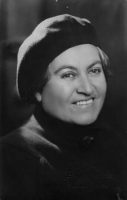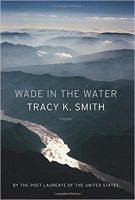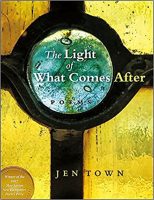April 6, 2018
Edited by David Sanders
Specimen Days
1327—Italian poet Petrarch 1st sets eyes on his beloved Laura.
1671—Jean-Baptiste Rousseau, French playwright/poet (Sacred Odes & Songs), is born.
1818—Aasmund Olavsson Vinje, Norwegian poet (d. 1870), is born.
1888 —Daniel Andersson, Swedish poet/writer (Svarta Ballader), is born.
1889—Gabriela Mistral [Lucila Godoy y Alcayaga], poet (Noebel Prize 1945) and diplomat, born in Vicuña, Chile (d. 1957), is born.
1935—Edward Arlington Robinson, US poet, dies.
1953—Idris Davies, Welsh poet (b. 1905), dies.

Let wind and salt and sand
drive you crazy, mix you up
so you can't tell
East from West,
or mother from child,
like fish in the sea.
And on the day, at the hour,
find only me.
—from “Song of Death” by Gabriela Mistral [translated by Ursula K. Le Guin]
World Poetry
Jay Bernard Wins Ted Hughes New Poetry Award

A London poet has won a £5,000 prize for new poetry for a performance work investigating a 1981 south London fire in which 13 black youngsters died. Jay Bernard received the Ted Hughes Award for Surge: Side A, performed at the Roundhouse in London last year. The New Cross Fire in Deptford, which some feared may have been a racist arson attack, is considered a defining moment in Black British history. Bernard is a film programmer at BFI Flare, London's LGBTQ+ film festival.
Google Honors Balagtas with ‘Doodle’ of Epic Poem

Internet giant Google on Monday celebrated the 230th birthday of Francisco “Balagtas” Baltazar with a doodle of his literary masterpiece “Florante at Laura.” An epic poem that symbolizes Baltazar’s own life journey, “Florante at Laura” was written in dodecasyllabic quatrains, which means it has 12 syllables per line, four lines per stanza, according to Google.
Sukmawati Soekarnoputri Reported to Police for Blasphemy over Poem Comparing Indonesian and Islamic Traditions
Sukmawati Soekarnoputri reporting firebrand cleric Rizieq Shihab to the police in October 2016.
Sukmawati Soekarnoputri, the daughter of Indonesia’s first president and founding father Soekarno, is facing legal action over a poem she wrote that offended many after it was accused of being blasphemous towards Islam. During last week’s Indonesia Fashion Week 2018 in Jakarta, Sukmawati read out her poem, titled Ibu Indonesia (Mother Indonesia), which celebrates Indonesian fashion and tradition, comparing them to Middle Eastern and Islamic traditions many have adopted in the country.
Jay Bernard has won a £5,000 prize for a performance work investigating a 1981 south London fire in which 13 black youngsters died.
Recent Reviews
Homing Signals
by Dawn Miranda Sherratt-Bado
The speaker of a poem from Leontia Flynn’s 2004 debut collection, These Days, memorably surmises, “the furthest distances I’ve travelled / have been those between people.” Lines of communication are a central preoccupation of Flynn’s oeuvre, which uses poetic lines to probe the spaces between people. Occasionally poetry can bridge these gaps, even if this connection only occurs within the mind of the speaker or reader. As its title indicates, Flynn’s new collection, The Radio (2017), gives primacy to the theme of receptivity. The tripartite volume features the responsive sections “The Child, The Family …”, “… And the Outside World”, and the more abstract final section, “Poems Conceived as Dialogues Between Two Antagonistic Voices”.
The Long Take by Robin Robertson Review – a Melancholy Love Song to America
Modelled on Hollywood’s postwar glory years, this masterful epic follows a second world war veteran across the US, and shows Robertson at the peak of his powers
by John Banville

In one of his more pontifical essays, TS Eliot declared that a poet could not be considered great unless he – he, necessarily – had produced an epic. The pronouncement takes for granted that there is general agreement on what constitutes an epic. But is there? Homer’s Iliad, Virgil’s Aeneid, Dante’s Divine Comedy, certainly; but what about, say, Alexander Pope’s The Rape of the Lock, Louis MacNeice’s Autumn Journal, Basil Bunting’s Briggflatts, or even Philip Larkin’s The Whitsun Weddings? An epic does not have to be of epic proportions, nor does it need to take the lofty classical tone; it can be humble, like us, composed, as WH Auden has it, of Eros and of dust. In The Long Take, which has an epical feel, Robin Robertson, one of the finest lyric poets of our time, deploys his artistic reach in a fiction narrative of more than 200 pages, composed in a mixture of verse and prose.
Poetry for Those Brutalized by Capitalism
Daniel Borzutzky's new collection confronts the perverse logics of fascism and the free market.
by Rebecca Stoner

Poet Daniel Borzutzky’s newest collection, Lake Michigan, out from the University of Pittsburgh Press last month, is his latest in a series that explores the underbelly of government, capital, and the privatizing, punitive regime of neo-liberalism—all the acts of violence that uphold current systems of power but that we've largely agreed to ignore. Its predecessor, The Performance of Becoming Human, won the National Book Award for Poetry in 2016. (Full disclosure: I am a former employee of The Wylie Agency, which represents Borzutzky.)
‘Seasonal Disturbances’ by Karen McCarthy Woolf, ‘Hello, Your promise has been extracted’ by Ahren Warner, ‘Kingdom of Gravity’ by Nick Makoha
by Vahni Capildeo
The clouds in the eggshell-blue sky are flattened and deliberate, as if graphing something that is other than themselves. Similar shapes occur outlined in white on a black sea, too inexact to be reflections of the clouds, too similar to the clouds to be waves. The technique of representation, and the tension, are akin to the supercharged dreamworld couple in Edvard Munch’s Møte i verdensrommet (Encounter in Space, 1898). In the lower left corner, a pirogue-like boat rides at anchor, or waiting for an enchanted command; it is not visibly moored.
Daniel Borzutzky’s newest collection, Lake Michigan, explores government, capital, and the privatizing, punitive regime of neo-liberalism.
Broadsides
Soviet Fate, Russian Hope
On Nadezhda Mandelstam’s literary achievements.
by Jacob Howland
Perhaps unsurprisingly, the centenary of the Russian Revolution was greeted in many quarters with what William Doino Jr. described in First Things as “a mix of romantic myth and Orwellian revisionism” (“Mourning the Russian Revolution,” February 27, 2017). Consider, for example, the calculated sentimentalism of The New York Times’s “Red Century” series, advertised as “exploring the history and legacy of communism.” One now-infamous article in the series, “Why Women Had Better Sex Under Socialism,” used the poorly sourced claim that women in countries like East Germany and Bulgaria enjoyed more sexual pleasure before the fall of the Iron Curtain to promote the genuinely obscene notion that “women had more fulfilling lives during the Communist era.” The author interviewed two nostalgic older ladies, but was unable to speak to the millions of women and girls whose lives were destroyed by forced relocation and imprisonment during Stalin’s “dekulakization,” or those who died of starvation and disease during his Five-Year Plans, or who saw their husbands and sons, fathers and brothers executed or shipped off to the Gulag during the Great Terror, and often followed them to the same fate. That the paper of record could print such mendacious rubbish is a telling symptom of the ideological sickness of our times.
The Last Poem I Loved: The Waste Land
by Emily Frisella
It is March, almost April, and the year feels like a spool of days spliced out of order, leaping treacherously from sun to ice to sun to rain to snow. In the office where I advise students on academic opportunities and college admissions, one of my co-workers talks endlessly about meteorology. When I was a high school senior applying to colleges, I attended an event where an admissions officer asked the crowd, “April is the cruelest month—do you know why Eliot said that?” I had not yet read The Waste Land, and I did not understand the appreciative chuckle that followed her response: “It’s the month when we send out rejection letters.” Now, I am waiting for my students’ results, and I find the joke a little funny. As March slips towards April, I host tutoring sessions and read practice essays for the AP exams.
What We Can Learn from Neruda’s Poetry of Resistance
By Mark Eisner March
When I first embarked on writing a biography of Pablo Neruda over a decade ago, I wanted to explore the political power of poetry and its capacity to inspire social change. Neruda’s social verse was an integral part of the humanity he expressed; even without pen in hand, he boldly inserted himself into direct action. I happened to finish the book—Neruda: The Poet’s Calling—at the end of Trump’s first hundred days in office. As a result, the questions that I’d been exploring for years suddenly took on new urgency. As resistance increasingly becomes the operative word in our current political reality, what can one of the most important and iconic resistance poets of the past century offer us? What might he give us as we continue to shape the next chapter in our own cultural story? Some answers, or at least perspectives, can be found in the vivid details of Neruda’s life and work.
What can we learn from Neruda’s poetry of resistance?
Drafts & Fragments
'His Misogyny Lacks Imagination': Poets Critique Sean Penn's #MeToo Poem
by Sara David
The actor's supposedly fictional novel "Bob Honey Who Just Do Stuff" ends with an epic poem where the woman-hating protagonist tries to take on the #MeToo movement. We asked professional poets what they think of it.
Sean Penn’s novel “Bob Honey Who Just Do Stuff” ends with a poem where the woman-hating protagonist takes on the #MeToo movement.
Poetry In the News
Cincinnati Poet Wins Walt Whitman Award

A Cincinnati writer is the winner of the 2018 Walt Whitman Award from the Academy of American Poets. Emily Skaja's book of poems, Brute, is the winning entry and will be published by Graywolf Press next year.
Elizabeth Ebert, ‘Grand Dame of Cowboy Poetry,’ Dies at 93
Ms. Ebert, who rose to queenly prominence within the chivalrous ranks of cowboy poetry, died on March 20 at a hospital in Bismarck, N.D., after breaking a hip. She was 93, and cognizant enough to remark, just hours before she died, that it was her wedding anniversary.
Emily Skaja is the winner of the 2018 Walt Whitman Award from the Academy of American Poets.
New Books
Wade in the Water: Poems by Tracy K. Smith
[Hardcover] Graywolf Press, 88 pp., $24.00

In Wade in the Water, Tracy K. Smith boldly ties America’s contemporary moment both to our nation’s fraught founding history and to a sense of the spirit, the everlasting. These are poems of sliding scale: some capture a flicker of song or memory; some collage an array of documents and voices; and some push past the known world into the haunted, the holy. Smith’s signature voice―inquisitive, lyrical, and wry―turns over what it means to be a citizen, a mother, and an artist in a culture arbitrated by wealth, men, and violence. Here, private utterance becomes part of a larger choral arrangement as the collection widens to include erasures of The Declaration of Independence and the correspondence between slave owners, a found poem comprised of evidence of corporate pollution and accounts of near-death experiences, a sequence of letters written by African Americans enlisted in the Civil War, and the survivors’ reports of recent immigrants and refugees. Wade in the Water is a potent and luminous book by one of America’s essential poets.
The Infinite Doctrine of Water by Michael T Young
[Paperback] Terrapin Books, 96 pp., $16.00
The gorgeous poems of Michael T. Young's The Infinite Doctrine of Water offer the rewards of deep reflection. The poet's sharp eye and attentive ear capture the delicate light and shadow of urban life and personal memory. New York and Jersey City provide the backdrop for subtle yet incisive meditations, as when "Devotional" portrays the Belt Parkway's approach to the Verrazano Bridge through a vivid moment of grace where "ranks of waves / wear breakers like medals of impermanence." In Young's hands, time's transience is enacted through quick shifts and sudden epiphanies in poems that are radiant, deeply felt, and always beautifully crafted. —Ned Balbo
The Light of What Comes After by Jen Town
[Paperback] Bauhan, 96 pp., $16.00

This collection, The Light of What Comes After, was selected by judge Jennifer Militello as the winner of the 2017 May Sarton New Hampshire Poetry Prize. Judge Militello writes, "Jen Town's The Light of What Comes After offers a sure manifesto against the domestic and cosmetic. Town's poems are wry and aware. Town's rich linguistic moments and surprising imagery lend her voice a slant which can seem playful and unafraid, but warning is always stitched just below the surface. This is a writer who knows 'Your debts / are more than you'll ever pay back.’"
Orphic Paris by Henri Cole
[Paperback] New York Review, 176 pp., $15.95
Henri Cole’s Orphic Paris combines autobiography, diary, essay, and poetry with photographs to create a new form of elegiac memoir. With Paris as a backdrop, Cole, an award-winning American poet, explores with fresh and penetrating insight the nature of friendship and family, poetry and solitude, the self and freedom. Cole writes of Paris, “For a time, I lived here, where the call of life is so strong. My soul was colored by it. Instead of worshiping a creator or man, I cared fully for myself, and felt no guilt and confessed nothing, and in this place I wrote, I was nourished, and I grew.” Written under the tutelary spirit of Orpheus—mystic, oracular, entrancing—Orphic Paris is an intimate Paris journal and a literary commonplace book that is a touching, original, brilliant account of the city and of the artists, writers, and luminaries, including Cole himself, who have been moved by it to create.
Milk by Dorothea Lasky
[Hardcover] Wave Books, 160 pp., $35.00

In her latest collection, Dorothea Lasky brings her signature style—a deeply felt and uncanny word-music—to all matters of creativity, from poetry and the invention of new language to motherhood and the production of new life. At once a personal document as it is an occult text—complete with the authors own occult drawings—,Milk investigates overused paradigms of what it means to be a creator and encapsulates its horrors and joys—setting fire to the enigma that drives the vital force that enables poems, love, and life to happen.
In her latest collection, Dorothea Lasky brings her signature style to all matters of creativity, from poetry to motherhood.
Correspondences
An Interview with R. A. Villanueva
by Mary Jean Chan

R. A. Villanueva’s debut collection, Reliquaria, won the Prairie Schooner Book Prize (U. Nebraska Press, 2014). New writing appears in Poetry, the American Poetry Review, Guernica, Prac Crit, and widely elsewhere. His honors include a commendation from the Forward Prizes, a Ninth Letter Literary Award, and fellowships from Kundiman, the Saltonstall Foundation for the Arts, and The Asian American Literary Review. A founding editor of Tongue: A Journal of Writing & Art, he lives in Brooklyn. This interview was conducted by Mary Jean Chan.
Wendy Xu on the Impossible Complexity of Immigrant Love
by Peter Mishler

In this next installment of Peter Mishler’s interviews with contemporary poets, Mishler corresponded with Wendy Xu, a poet and writer living in Brooklyn. Xu is the author of Phrasis(Fence, 2017, winner of the Ottoline Prize), and You Are Not Dead (Cleveland State University Poetry Center, 2013). The recipient of a 2014 Ruth Lilly Fellowship, her poetry has appeared in The Best American Poetry, Boston Review, Poetry, A Public Space, and elsewhere, with fiction and essays appearing in BOMB and BuzzFeed. Born in Shandong, China, in 1987, she currently teaches in the Creative Writing MFA Program at Columbia University, and is poetry editor for Hyperallergic.
In the newest installment of Peter Mishler’s interviews with contemporary poets, Mishler corresponded with Wendy Xu.
Envoi: Editor’s Notes
Petrarch
On the occasion of the anniversary of Petrarch's first sighting of Laura nearly 700 years ago, I thought it fitting to reproduce one of his poems for her, as translated by Robert Guthrie Macgregor. Enjoy.
Sonnet 101 [Ways apt and new to sing of love I’d find]
Ways apt and new to sing of love I’d find,
Forcing from her hard heart full many a sigh,
And re-enkindle in her frozen mind
Desires a thousand, passionate and high;
O’er her fair face would see each swift change pass,
See her fond eyes at length where pity reigns,
As one who sorrows when too late, alas!
For his own error and another’s pains;
See the fresh roses edging that fair snow
Move with her breath, that ivory descried,
Which turns to marble him who sees it near;
See all, for which in this brief life below
Myself I weary not but rather pride
That Heaven for later times has kept me here.
—Petrarch, 1304 – 1374
“Desires a thousand, passionate and high” – Petrarch